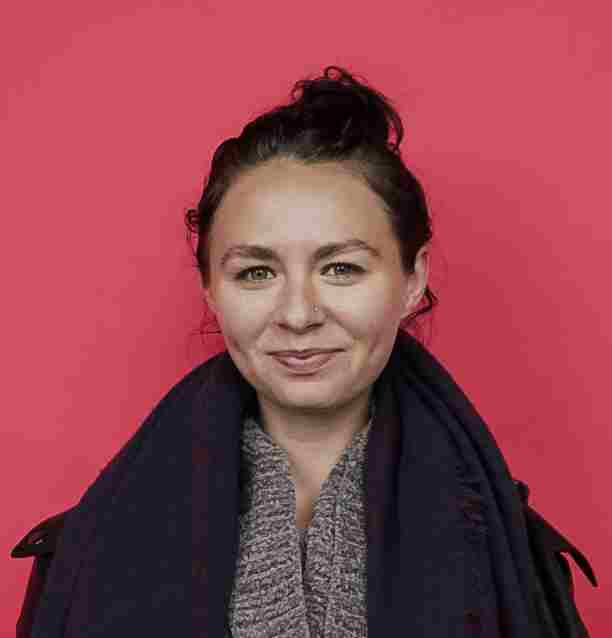I’m $50,000 in Debt and Reconsidering the Value of Higher Education
After I graduated from college, I stumbled, tripped, and smacked my face on a painful $50,000 debt bill. I went from being a young adult to a full-fledged debt payer in a matter of months.
Living paycheck-to-paycheck in the hospitality industry is a whirlwind you feel like you’ll never get ahead of, especially when you have two degrees.

I worked full-time at one restaurant and picked up another job to pay off my monthly loan payments. I had enough and then some after subtracting the loans from my paychecks.
I felt in control.
That was all until I realized that the odds of paying off the debt were stacked against me—not just me, but for every graduate who borrows money to finish their degree.
With income-driven plans, loans accrue more interest the less money you make (AKA the less money you’re paying back).
With 10-25 year payment plans, loan agencies pin you down to a lifetime of give-and-take decisions.
“Can I even afford to move into a better apartment or take time off from work to travel with my loans?”
There don’t seem to be realistic options. You feel like you’ll never get ahead in a dead-end job. You’ll bend the knee (a Game of Thrones reference seemed applicable) to Uncle Sam for life.
Forbes writer Jack Kelly argues that college administration is to blame. Advisors focus more on pushing students up the course chain instead of coaching them on how to move beyond underemployment, periods of uncertainty, and unemployment, Kelly suggests.

College seniors graduate with an average of $30,000 in debt. Now that the coronavirus has wreaked havoc on the 2020-21 school year, questions about how to afford higher education in America have resurfaced in anxious waves.
Borrowing loans may be the only option for some students.
Although the government suspended federal loan payments at 0% interest rate until September, I still have to doll out my unemployment checks to Sallie Mae, a private loan lender.
Private loan predators are on the prowl for vulnerable, broke borrowers in the wake of coronavirus. Even after calling to plead for forbearance, Sallie Mae could only guarantee me three months; that’s with the added interest, of course. Despite being officially put on the forbearance list, they’ve emailed me since the beginning of the coronavirus hardship to remind me of my upcoming balance.
I’m worried for the next crop of students heading to college this fall.
Because of the coronavirus, I was one of the millions of people who applied for weekly unemployment claims. The $600 added government benefit made a difference in my day-to-day life. I was able to take a breather and not worry too much about bills.
I now understand how government assistance was a blip in the grand scheme of things. My college debt is and was still there the whole time.
Even though I’ve started paying on my loans again, at least for a couple of months, I felt what it was like to be a debt-free, young woman in America.
The unknowing lie your parents tell you
Two years out of college, I think about the narratives we feed to Millennial high school students about their future. GenZ parents want the best for their kids plus everything they never had.
“You’ll go to college and then doors of opportunities will open for you. You’ll have more than we did.”
For the kids whose parents said this, it was a primary motivator for going to college. Data from Insider Higher Ed cites that one of the five major reasons students enroll in college is to meet other people’s expectations.
Today, this is important because the GenZ “college then job” narrative might change as looming debt holds students back from applying to college.
My parents left home as teenagers and started working jobs to support their children.
Before they were 20, they paved a future based on getting by and making a living; they worked hard so we could take beach vacations, go out to dinner, and own a house.
I was worlds apart from my parents.
At 18, I waited out the summer before college with agonizing impatience. I never felt challenged at my high school, even in AP classes which masqueraded as cultural supernovas. With strict curriculum guidelines, the teachers hashed out the same material they’d been teaching year after year. The promise of passing AP exams and winning college credit helped me stay focused—and aware of the ensuing financial responsibility soon to become my reality.
But even then, the enormous cost of college was at the back of my mind.
I couldn’t relate to my hometown friends. It was teenage displacement and public school drudgery—nothing revolutionary—but it explains why I chose to enroll at a private liberal arts college. The esteem alone made me feel like I’d jumped lightyears forward into sophistication and prestige.
The adults in my life had crisscrossed opinions about this decision. My parents, of course, hugged my neck with pride for getting accepted and receiving scholarships and federal aid; my academic advisor, on the other hand, looked at me from across her desk, with my acceptance letter between us, and told me that I wouldn’t be able to afford it.
She brought up my socioeconomic status. The $50,000 price tag of a liberal arts education would be too high for someone belonging to the lower-middle class.
My advisor suggested I stay within my means and enroll at a public university.
At that moment all I heard was “you can’t do this.” In my mind, she told me I was too poor and too undeserving of the same educational experience as students who were better off.
So my natural teenage impulse was to prove her wrong.
This desire to prove “them” wrong—the proverbial “them” representing leaders of systematic inequality—combined with my parents’ encouragement to “do more” forged the work ethic I have today.
It would mark me all the way through college as I fought to blend in among my peers.
While I reapplied each semester for student loans and received notices from the university of expulsion due to my outstanding tuition balance, I always wondered if the upper-middle class students around me dealt with similar stress. I often found myself compensating for not having enough money by working twice as hard to succeed.
Now that I’m 24-years old and graduated, I’m still wondering when the elusive promise land of opportunity will present itself.
So I did what other lost college graduates do after walking the stage. I got a waitressing job.
What can I get for you today?
…I’d ask customers over and over again as I schemed of ways to use their connections to my advantage.
On top of waiting tables, I worked overtime applying for editing and marketing jobs. Hours tweaking my resume turned into weeks of employer silence.
My ego was bruised every time my regular customers asked me how the job search was going. Those of us in the service industry understand how customers become your biggest fans, especially if you’re that waitress “with big dreams.”
The thing is, my dreams weren’t that farfetched in respect to my degree skills.
I’m bilingual in French with a background in Communication. I like to talk to people and write about their problems.
I felt like there had to be at least one marketing agency that would hire me. I did everything by the book: I crafted job-specific cover letters, I connected with LinkedIn professionals, and I presented myself to business owners in my field.
The job market was so saturated in my college city that waitressing was the only way I could provide a living wage for myself.
My inability to move forward with my career interfered with my mental health, causing me to feel hopeless. One professor who I became close with checked in regularly to offer guidance.
To counter Forbes writer Jack Kelly’s objection to college administration, this professor spoke on my behalf and continuously directed me to job openings, not to forget her relentless support in offering encouragement about my work situation.
For one last good measure, I revisited my university’s career center. I met with a counselor who bragged about his upcoming retirement while he glazed over my LinkedIn profile and told me to update my cover photo. Then he scrolled through an alumni database and pointed out how I should network with fellow graduates.
I did everything Mr. Counselor suggested. But months went by, I was still working in restaurants, and then I fell deeper into financial crisis.
One of my loans went into default and I had to apply for forbearance on another.
Skipping along in forbearance and default
Throw me in with the other 25% of borrowers who defaulted on their loan in 2018. If ¼ of borrowers are missing payments, the issue is not that we’re unwilling to pay, but that we’re struggling within a system which puts us at their mercy from the start.
Young adults graduate from college with a six month grace period before loan agents start mailing out billing statements. Six months may seem like a long time, but the University of Washington reports that it takes graduates three to six months to secure their first job after graduation.
I had to be proactive and pivot my strategy or else shut my mouth and continue working in restaurants.
I wanted more for myself. It was mentally exhausting to plan for a future that didn’t involve student loans interfering with my livelihood. My prove-”them”-wrong syndrome washed over stronger than before.
Leaving job security to become a freelance writer
After my taxes came back in February, I decided to cut my hours at the restaurant job and dive into freelance writing.
Living off of my tax return, I could focus on landing clients without worrying about coming up with rent, buying groceries, and paying back my student loans.
It’s funny, about a week after I became a full-time freelancer, I had already secured a full-time contract with a digital publication.
Those two years I spent sweating in restaurants and pouring my energy into applications for jobs in my college city were efforts I thought would help me find my footing. I thought name recognition would work to my advantage if employers picked up on the university connection.
It all led me nowhere.
The sense of autonomy I have through freelance writing is enough to get me out of bed every day. Although I do wonder how I’ll ever become financially stable enough to live the life I imagined with federal and private loans on my shoulders, the $50,000 elephant in the room doesn’t weigh as heavy on my morale.
I’ve been fortunate to capitalize on the stay at home mandate during the coronavirus to grow my freelance business. I studied and learned from other freelancers about how to make money as an independent contractor.
But in between freelance work, I’ll fall back on hospitality. At least I’ll have initiated a plan to minimize the depressing reality of student debt.
Like my parents did at my age, I have to find a way to get by and try to get ahead.
Because that’s what we do to survive, with or without a college degree.

About the Author: Olivia Walters writes articles, blogs, and essays about life after higher education, travel, relationships, cannabis news, and inspiration for other writers. You can read her work at oliviatwalters.com.